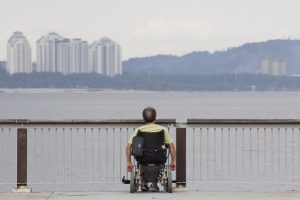Social Disconnection and Living Arrangements among Older Adults: the Singapore Chinese Health Study
February 2, 2023

In February 2021, the Ministry of National Development, Ministry of Health, and the Housing & Development Board of Singapore jointly launched the new Community Care Apartments catered to seniors who want to live independently and prepare for their future care needs. In the Asian context, seniors living alone are often perceived to be more vulnerable than those living with their family members, who can presumably look after the elderly.
In ‘Social Disconnection and Living Arrangements among Older Adults: the Singapore Chinese Health Study’ (Gerontology, 2022), Dr Jon Barrenetxea (Duke-NUS Medical School), Dr Yi Yang (Duke-NUS Medical School), Professor An Pan (Huazhong University of Science and Technology), Associate Professor Qiushi Feng (NUS Sociology and Anthropology) and Professor Woon-Puay Koh (NUS Yong Loo Lin School of Medicine) examine factors associated with social disconnection among the elderly. ‘Social disconnection’ refers to the lack of social, emotional, and physical engagement with others, which is measured by a specific index in this study. The study pays particular attention to two groups of elderly: those living alone and those living with others.
Traditionally, it is believed that older adults living alone are at higher risk for social disconnection, because living alone may prevent them from receiving immediate healthcare and emotional support. However, the authors postulate that the mental and physical limitations for the elderly living with others may still restrict their capacity to maintain social relationships. Conversely, good health is often the precondition for a senior to live independently. Moreover, individuals could differ in social interactions due to their different personalities and cultural backgrounds, regardless of living alone or not.
The authors thereby argue that living alone may not be a robust indicator to identify seniors at risk of social disconnection, and back this hypothesis with empirical data drawn from surveys of 16,943 community-dwelling older adults in Singapore. They found that about 88% of the participants lived with their immediate family members, and half of such participants reported that they were in a poor/fair health condition. About 6% of the participants were socially disconnected. Among them, 85.6% lived with others. Socially disconnected participants were older and more likely to be men. Even though only 14.4% of the socially disconnected lived alone, statistical analysis shows that living alone is still a significant risk factor for social disconnection. Besides living status, low education, and disabilities, poor health and depression are also factors positively associated with social disconnection.
The survey data also indicates that the proportion of socially disconnected elderly in Singapore is lower than that reported in overseas studies. The authors note that this could be due to social support offered by the government. However, given that social disconnection can also occur for those living with others, they stress that community intervention could be extended to those living with others but in poor health condition.
Read the article here: https://www.karger.com/Article/Abstract/516626
